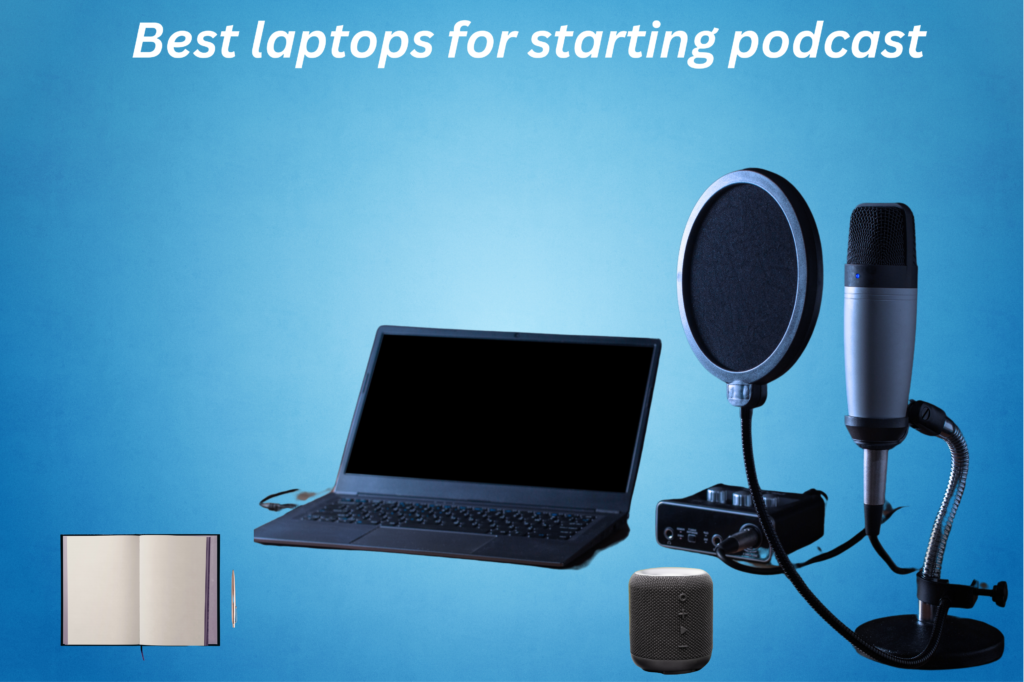Over the past decade, podcasting has grown in popularity, allowing storytellers, educators, and entertainers to reach global audiences. Whether starting or upgrading, you need the ideal laptop for high quality podcasts. This article covers the best podcast laptops for audio editing, processing, storage, and more.

Why Your Laptop Choice Matters in Podcasting
Understand why choosing a podcasting laptop is critical before looking at specific models. Podcasts are recorded, edited, and sometimes live streamed. A laptop that can multitask, edit audio, and store huge files is needed for this process. A good laptop lets you focus on content creation rather than technological issues.
Key Features to Look for in a Podcasting Laptop
When selecting a laptop for podcasting, consider the following key features:
Processing Power (CPU):
Audio editing software needs a fast processor. Look for laptops with Intel Core i5 or AMD Ryzen 5 processors.
RAM:
Working with numerous tracks makes audio editing memory intensive. A minimum of 8GB RAM is recommended, but 16GB is best for intensive tasks.
Storage (SSD vs. HDD):
Audio podcasts, exceptionally high-quality ones, require a lot of storage. SSDs are superior to HDDs for speedier load times and higher performance. Storage should be at least 256GB and expandable.
Audio Quality:
Podcasting uses external microphones, yet built-in audio quality matters. Check computers for suitable internal audio components or connectors for high-quality external audio equipment.
Portability:
A portable laptop is essential for podcasting on the road. Make sure portability doesn’t compromise performance.
Battery Life:
A long battery life is essential to record or edit without electricity.
Operating System Compatibility:
Choose a laptop that works with your audio editing software, such as Audacity, GarageBand, Adobe Audition, or others.
Top Laptops for Starting a Podcast
Based on the criteria above, here are the top laptops that are perfect for starting a podcast:
Apple MacBook Air M2
Processor: Apple M2 microprocessor.
RAM: 8 GB, expandable to 16 GB.
Storage: 256GB SSD storage is available for upgrading to 512GB or 1TB.
Battery Life: Maximum Battery Life of 18 Hours.
Operating System: macOS.
Why It is Outstanding:
Podcasters, especially those who like macOS, will find the Apple MacBook Air M2 a great option. The M2 chip’s strong performance makes multitasking and audio editing run smoothly. The laptop is ideal for podcasting on the road because of its lightweight construction and excellent battery life. Additionally, GarageBand, a well-liked audio editing program for novices and experts, is natively accessible on macOS.
Dell XPS 13
Processor: Intel Core i7 1360P processor found in Dell XPS 13.
Memory: 16GB.
Storage: 512GB.
Battery Life: 12-hour battery life is possible.
Operating System: Windows 11 is the operating system.
Why It is Outstanding:
Despite its small size, the Dell XPS 13 is a powerful device. It is the perfect tool for podcasters who need to edit audio and generate visual content like cover art because of its high-resolution display and superb build quality. It’s a flexible choice for creators because the 16GB of RAM guarantees seamless performance while running many applications simultaneously.
Microsoft Surface Laptop 5
Processor: Intel Core i7-1255U processor.
RAM: 16GB.
Storage: 512GB.
Battery Life: Extended Battery Life 15+ Hours.
Operating System: Windows 11 is the operating system.
Why It is Outstanding: The Microsoft Surface Laptop 5 provides the ideal balance of portability and performance. The laptop’s lightweight construction makes it convenient to carry around, and the touchscreen function can benefit hands-on editing. Long battery life and a high quality display are two other features that set the Surface Laptop 5 apart and make it perfect for prolonged editing sessions.
HP Spectre x360
Processor: Intel Core i7 1355U processor found in HP Spectre x360.
RAM: 16 GB.
Storage: 512GB SSD for storage.
Battery Life: Maximum 13 hours of battery life.
Operating System: Windows 11 is the operating system.
Why It is Outstanding: The HP Spectre x360 is a flexible 2-in-1 laptop ideal for podcasters on the go. Thanks to its 360-degree hinge, you may use it as a tablet, which is helpful for recording sessions. The Spectre x360’s strong processor and lots of RAM allow you to tackle even the most taxing audio editing jobs efficiently.
Acer Swift 3
Processor: AMD Ryzen 7 7735U.
RAM: 8GB; SSD.
Storage: 512GB.
Battery Life: Maximum Battery Life of 11 Hours.
Operating system: Windows 11 is the operating system.
Why It is Outstanding:
The Acer Swift 3 is an excellent buy for podcasters on a tight budget. Its low cost doesn’t mean that performance is sacrificed. Podcasters constantly on the go will find the laptop’s lightweight design and AMD Ryzen processor an excellent combination for handling audio editing applications.
ThinkPad X1 Carbon Gen 11
Processor: Intel Core i7 1365U processor
RAM: 16 GB
Storage: 512GB SSD for storage
Battery Life: Maximum 14 Hours
Operating System: Windows 11 is the operating system.
Why It is Outstanding: Professionals love the Lenovo ThinkPad X1 Carbon because of its robust construction and superb keyboard. With its strong processor and lots of RAM, the X1 Carbon provides dependable performance for podcasters. It is also very portable, so you can easily carry your podcasting setup anywhere.
Asus ZenBook 14
Processor: AMD Ryzen 9 7940HS
RAM: 16GB;
Storage: 1TB
Battery Life: Longest Battery Life: ten hours
Operating System: Windows 11 is the operating system.
Why It is Outstanding:
For podcasters who require a laptop that strikes a mix between portability and performance, the Asus ZenBook 14 is an excellent choice. With a 1TB SSD and an AMD Ryzen processor, it has excellent performance and enough storage for all your podcasting files. Because of its sturdy construction and extended battery life, the ZenBook is a dependable partner for podcasters.
How to Choose the Right Laptop for Your Podcasting Needs
It cannot be easy to select the best laptop for podcasting when there are so many excellent choices. Here are some pointers to assist you in choosing wisely:
Consider Your Budget:
Decide how much you’re prepared to pay. Although higher-priced laptops have more functionality, some lower-priced models can handle podcasting chores well.
Think About Your Workflow:
Think about how you will use your laptop. If your primary tasks are audio recording and editing, prioritize processor speed and RAM. If you also intend to handle social media or produce visual material, you might require a laptop with a strong graphics card and display.
Portability vs Performance:
Choose which is more important to you: performance or portability. If you podcast from a fixed place, prioritize a more powerful laptop. A lightweight, portable laptop can be a better option if you’re often on the go.
Check Software Compatibility:
Make sure the laptop you select is appropriate for the audio editing program you want to use. Certain operating systems are better suited for specific software.
Future Proofing:
Consider what you will need in the future. Purchasing a laptop with expandable RAM or storage can help it last longer and meet your growing podcasting needs.
Conclusion
Starting a podcast is exciting; having the perfect laptop can help you succeed much more. The laptops on the above list provide various options to fit multiple demands and price ranges, regardless of whether you are just starting or looking to upgrade your gear. You can select a laptop that will make it easy to produce podcasts of the highest caliber by considering features like portability, RAM, processing power, and storage.
Purchasing a high quality laptop is only the first step. As your podcast expands, you should always look into new resources and techniques that can improve the caliber and audience of your production. A passion for storytelling combined with the appropriate tools can allow your podcast to reach a global audience of listeners.
